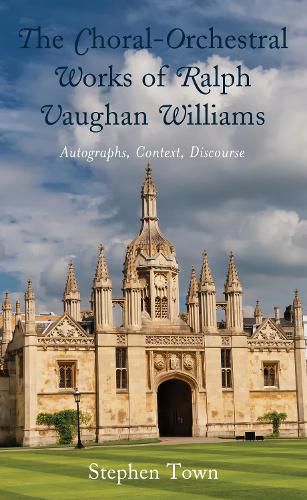Readings Newsletter
Become a Readings Member to make your shopping experience even easier.
Sign in or sign up for free!
You’re not far away from qualifying for FREE standard shipping within Australia
You’ve qualified for FREE standard shipping within Australia
The cart is loading…






The Choral-Orchestral Works of Ralph Vaughan Williams: Autographs, Context, Discourse combines contextual knowledge, a musical commentary, an inventory of the holograph manuscripts, and a critical assessment of the opus to create substantial and meticulous examinations of Ralph Vaughan Williams’s choral-orchestral works. The contents include an equitable choice of pieces from the various stages in the life of the composer and an analysis of pieces from the various stages of Williams’s life. The earliest are taken from the pre-World War I years, when Vaughan Williams was constructing his identity as an academic and musician-Vexilla Regis (1894), Mass (1899), and A Sea Symphony (1910). The middle group are chosen from the interwar period-Sancta Civitas (1925), Benedicite (1929), Magnificat (1932), Five Tudor Portraits (1935), Dona nobis pacem (1936)-written after Vaughan Williams had found his mature voice. The last cluster-Thanksgiving for Victory (1944), Fantasia (Quasi Variazione) on the ‘Old 104’ Psalm Tune (1949), Sons of Light (1950), Hodie (1954), The Bridal Day/Epithalamion (1938/1957)-typify the works finished or revisited during the final years of the composer’s life, near the end of the Second World War and immediately before or after his second marriage (1953).
$9.00 standard shipping within Australia
FREE standard shipping within Australia for orders over $100.00
Express & International shipping calculated at checkout
The Choral-Orchestral Works of Ralph Vaughan Williams: Autographs, Context, Discourse combines contextual knowledge, a musical commentary, an inventory of the holograph manuscripts, and a critical assessment of the opus to create substantial and meticulous examinations of Ralph Vaughan Williams’s choral-orchestral works. The contents include an equitable choice of pieces from the various stages in the life of the composer and an analysis of pieces from the various stages of Williams’s life. The earliest are taken from the pre-World War I years, when Vaughan Williams was constructing his identity as an academic and musician-Vexilla Regis (1894), Mass (1899), and A Sea Symphony (1910). The middle group are chosen from the interwar period-Sancta Civitas (1925), Benedicite (1929), Magnificat (1932), Five Tudor Portraits (1935), Dona nobis pacem (1936)-written after Vaughan Williams had found his mature voice. The last cluster-Thanksgiving for Victory (1944), Fantasia (Quasi Variazione) on the ‘Old 104’ Psalm Tune (1949), Sons of Light (1950), Hodie (1954), The Bridal Day/Epithalamion (1938/1957)-typify the works finished or revisited during the final years of the composer’s life, near the end of the Second World War and immediately before or after his second marriage (1953).